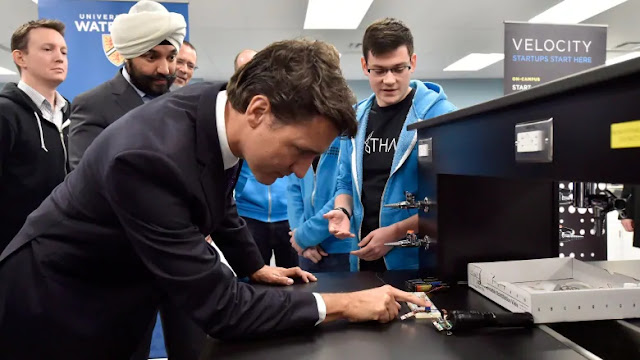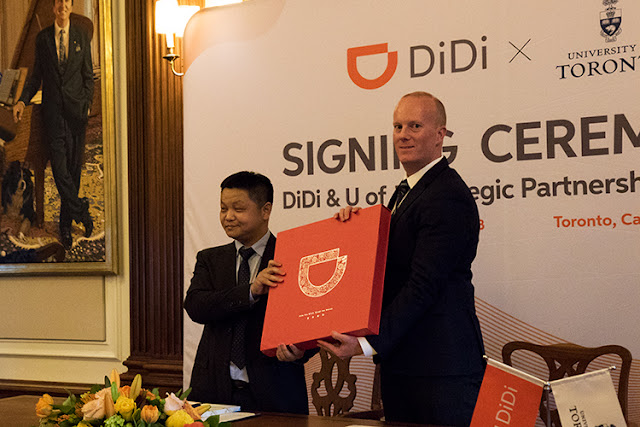Canadian Universities Have Extensive Research Partnerships With Chinese State To Develop A “Surveillance” Society Against “Far Right Canadians”
by
Can you believe this? Quietly behind our backs our universities have been reaching extremely lucrative agreements with the Communist Party of China to cooperate in the development of “surveillance and population control technologies and the use of facial recognition, and digital monitoring” against those who question mass immigration and the rise of China to global supremacy. Chinese financial power will be combined with Western scientific research to develop technologies that will allow the Canadian government to surveil “every health record, every banking record, every social media post” of Canadians to ensure the peaceful replacement of whites.
The Globe & Mail, however, does not grasp the full implications of what’s going on. We can’t understand these partnerships solely in terms of how they benefit the Chinese military. These research exchanges need to be conceptualized as part of a wider attempt to develop a surveillance society that will ensure the fulfillment of the program of racial diversification. We know that a fundamental mission of our universities, as openly stated in their official websites, is to brainwash students to accept the total diversification of Canada. Behind the scenes universities have taken another crucial function: the development of a Canada that is under “total surveillance” for the purpose of eradicating any form of dissent.
Huawei and UBC
As part of these agreements, Gupta met with key members of the Chinese Communist Party including Hao Ping, vice minister of education; Zhang Jianguo, minister of the State Administration of Foreign Experts Affairs; Wu Gang, vice-mayor of Chongqing; and Liu Jinghui, secretary general of the China Scholarship Council.
More recently, after Santa Ono became the president of UBC on June 2016, UBC finalized a $7.8 million deal on projects with Huawei to research “advanced communications and 5G projects.” 5G is a wireless technology that holds the promise of total connectivity and total surveillance. The research to be financed includes cloud computing, the privacy and security of artificial intelligence, digital image forgery detection and silicon chip fabrication. All in all, 32 UBC projects have received Huawei funding since 2017.
Arrest of Meng Wanzhou
But even as legal proceedings were mounting against Meng, UBC started two new research projects on next-generation 5G wireless technology. In May 2019, the UBC research vice-president, Gail Murphy, said that the university “will continue with its partnership” with the Chinese company, which have been in place since 2011.
“Huawei has continued to pour money into UBC projects, even after the arrest of Meng Wanzhou“. While a few professors expressed fears about taking part in Huawei-financed projects, since the arrest of Meng, 18 new projects have been earmarked for Huawei funding at UBC, totaling C$2.6 million. To this day, in its official website, UBC proudly lists Huawei as a major partner.
The Chinese know that Canada is the weakest link in the Western world, an enfeebled nation without an army yet in charge of huge tracks of land with abundant resources ready to be colonized by the most rapacious consumers in human history: 1400 million Chinese versus a pathetically weak Canadian population of 37 million rootless mongrels. The Chinese government eyes Canadian/Western scientific education very highly; and it has trillions to invest everywhere, and Canada is the most auspicious place to take over.The Chinese know that our universities are pro-Asian and anti-Western. They know that the academics working in these universities are committed to the promotion of non-whites and the degradation of the white race. They know that Western science is still more advanced overall than Asian science, so “they’re looking for help from Canada in artificial intelligence, biotechnology, advanced materials, quantum computing, all areas that can help their military and help other aspects of their economy as well,” according to Robert O’Brien, US national security adviser.
University of Waterloo
 |
| Justin Trudeau tours Huawei research program at Waterloo. Former CSIS director says China views Canada as an ‘easier target’ |
Back in 2016, Huawei announced that it had a research and development office in Waterloo with thirty employees, and that it planned to hire another 20. When UW president Feridun Hamdullahpur visited Huawei’s headquarters in Shenzhen in 2016, he signed a partnership with the company that put $3 million into research “related to cloud computing, data management and data analytics.” In total, the university says that Huawei has provided $15.3 million in research funding over the past five years for 16 projects, which include research into wireless systems, autonomous driving and network virtualization.
The company funds a math scholarship at UW and an engineering-science entrance award. Huawei also is a sponsor of the Waterloo Artificial Intelligence Institute launched at UW last April. The University of Waterloo is packed with Chinese students. International Chinese students alone totaled more than 7,500 students in 2018. The Communist Party knows that most of its sponsorship will land in the hands of Chinese foreign students or Chinese-“Canadians”.
Multiple Universities are Involved
Huawei struck similar agreements with many other Canadian universities.In the province of Ontario at large Huawei announced in 2016 that it was spending $303 million on research projects related to 5G networks. To this day the company employs more than 500 additional employees at research facilities in Markham and Ottawa.
These partnerships by university presidents across Canada are being done despite the fact that “the company has come under scrutiny for developing advanced surveillance technologies that are being field tested in China’s Xinjiang region, home to the Uygur Muslim minority group, which has long complained of oppression. These surveillance and population control technologies use facial recognition, digital monitoring and artificial intelligence.”
 |
| Ted Sargent, U of T’s vice-president international, participates in a signing ceremony with DiDi Senior Vice-President Jun Yu (November 2018) |
Here is a short list of the many agreements reached by multiple universities with Huawei and other Chinese companies.
- The University of Toronto eulogizes about its partnership with the Beijing-based company “DiDi”, which boasts a half billion users, that will allow DiDi “to tap into the university’s expertise in artificial intelligence and transportation planning as it builds a global network.“
- The president of the University of Alberta brags about how his university has “developed extensive connections with China over the past 40 years“. Among the multiple partnerships there is one with Tsinghua University concerning the development of sustainable, low-carbon energy to improve China’s economic standing in the world.
- The University of Ottawa and the Chinese Academy of Sciences Shanghai Institute of Materia Medica have co-founded “a state-of-the-art Joint Research Centre on Systems and Personalized Pharmacology.” Jacques Fremont, president of the University of Ottawa, gushed about “an intense relationship, especially in medical studies, engineering and education.” We always have dozens of Chinese people coming under specific programs.” Fremont added.
- The University of Guelph told CBC News that Huawei has invested in two research projects, but declined to provide details on the nature of that research.
- McGill University is another university actively working in partnerships with China in areas such as engineering, architecture, neuroscience, genomics and biomedical sciences.
- Polytechnique Montreal has seen much collaboration with China in the field of aerospace and transportation area for almost 30 years, from signing an agreement with Harbin Institute of Technology in 1988 to another with Beihang University in 2015.
- Quebec City’s Laval University is very secretive, saying only that “the investment of Huawei is confidential as per the collaborative contracts.”
- Queen’s is also very secretive other than stating that its ties with China will “become even more extensive and important in coming years”.
Take Action: Request Information from UBC
Here is the link to UBC regarding access to information about research: https://universitycounsel.ubc.ca/subject-areas/access-and-privacy-general/access-to-information/
Contact: Office of the Vice-President Research + Innovation
E-mail research.innovation@ubc.ca
Ask this office for information about their partnerships with Chinese companies, including Huawei, and the Chinese Communist Party. Ask them for names of professors involved in these partnership and the amount of money involved and the types of technology transfers and research involved. Tell them you are concerned that UBC is engaged in a lucrative financial deal to sell out Canadian knowledge to Chinese communists in exchange for Chinese expertise in surveillance techniques intended to police the lives of Canadians who think for themselves.





